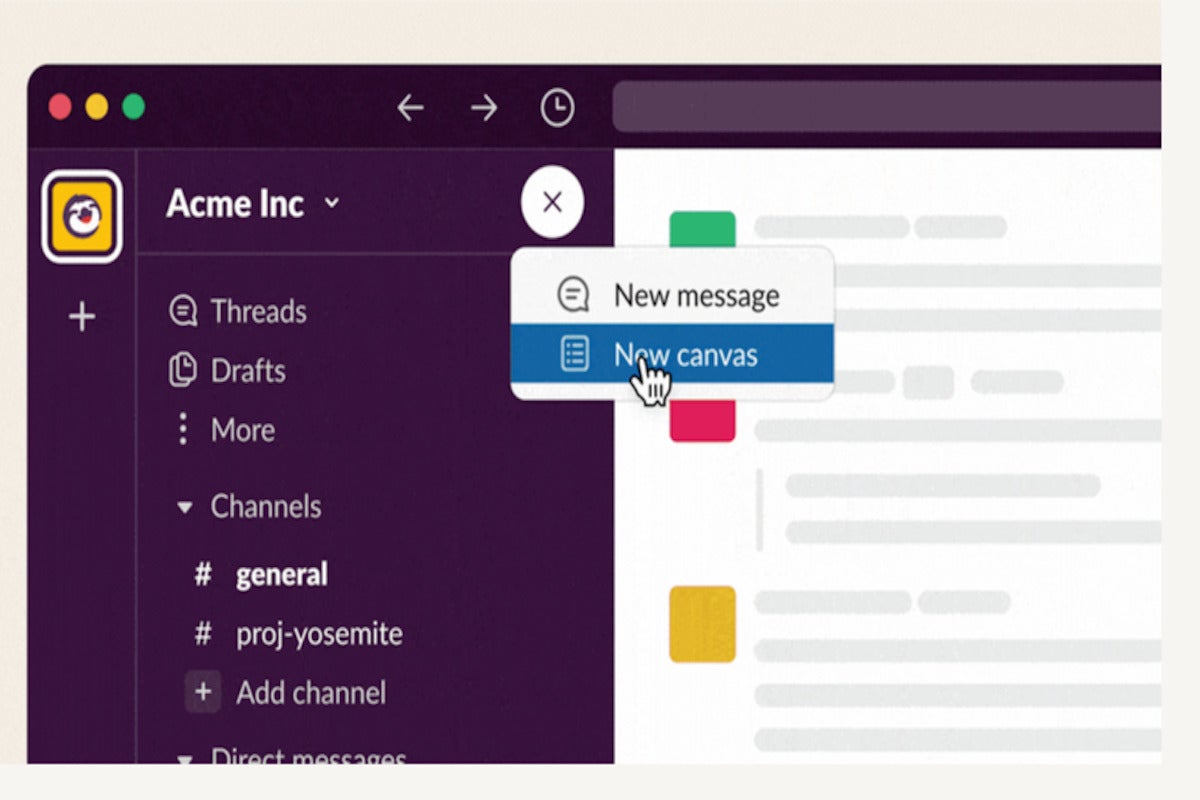































Slack has announced the launch of its new Slack Canvas tool, a brand new digital surface that allows teams to capture and store information directly inside their workspace.
The announcement was made at this year's Dreamforce conference in San Francisco, 14 months after Salesforce announced it had completed its$27.7 billion acquisition of the messaging platform.
Research undertaken by the company shows that lots of its customers are split between several different modes of work, with about 34% of knowledge workers spending at least part of their week back in the office, according to Olivia Grace, senior director of product at Slack.
Grace said that as a result, Slack is increasingly hearing customers ask how they can continue to collaborate effectively while navigating all these different ways of working.
"At Slack, our answer is that we want to help customers by providing them with a digital HQ," Grace said. "We want to make what was hard in the office better. We want to bring things we love from the office, and we want to create new things which are unique to the digital headquarters."
Functioning as a surface inside a Slack workspace, Canvas forms a persistent layer, allowing teams and individual users to capture any type of information, find answers, and move work forward from one centralised tool.
 Slack
Slack The new Slack Canvas feature is designed to let teams capture and store information directly inside their workspace.
Canvases can be created by clicking a button on the right hand panel of a Slack workspace and then used as either a personal information store or attached to a specific channel, providing users with an easy way to access pertinent information.
Only one Canvas can be attached to each channel, but it can include text, images and files such as Excel spreadsheets or PDFs; clips or videos from external sites; embedded web pages and links to other Slack channels, individual Slack profiles; and embedded Slack messages.
Furthermore, users can pull data and records from tools such as Salesforce, Tableau, Google Workspace, JIRA and Figma, and embed the relevant information into a Canvas.
Slack Canvas also offers workflow automations, which allow people to automate business-critical tasks right inside of a Slack workspace and can now also be handled directly inside a Canvas, while any edits made to a channel's canvas will appear in the same place as threads, meaning users are continuously notified when comments or updates are made.
"There's sometimes a real need for a persistent layer to capture pieces of information that are perpetual," Grace said. "In real time Slack conversations, sometimes you'll write something that's important, such as your schedule for the week or maybe a bigger document that you're preparing a pitch, and it just disappears off the top of the messages, leaving you wishing it could be made more permanent. Canvas is offering exactly that."
Slack is yet to announce its timeline for making Slack Canvas generally available, or how it will be priced.
Alongside the launch of Slack canvas, Slack made two other announcements during its Dreamforce keynote.
At the end of 2021, Slack announced it was re-engineering its platform to make it easier for users to customize their digital HQs to meet their organizations' needs. Today, Slack has announced that the new Slack platform is now available to developers in open beta, along with a new set of developer tools, providing users with faster and more flexible ways to build automations on top of Slack.
Secondly, Slack has announced the general availability of its new Huddles functionalities. First launched at Slack Frontiers in June 2022, users will be able to make video calls to each other directly inside Slack, have two people simultaneously screen-sharing, and access a persistent message thread on the right-hand side of the huddle screen that lets users share files and links during a huddle meeting.
For users on a free Slack plan, Huddles will remain limited to two participants, while paid users can form a video or audio Huddle with up to 50 people. Users that are not members of a specific channel can still be invited into that channel's Huddles but won't have access to the new persistent message thread or be made a channel member.
Grace said that research carried out by the Future Forum, a consortium launched by Slack in 2020 to drive workplace change through original research, case studies, position papers, and events, found that across the globe, more then 94% of knowledge workers indicated they care more about schedule flexibility than location flexibility.
"That's why it's important that Huddles allows you to have a level of flexibility in your schedule by reducing that time spent talking to someone... and the benefits that people are seeing as far as you know, burnout and stress levels of employees are really powerful," Grace said.
 Tags quentes :
Pequenas e Médias Empresas
Software de colaboração
Software de Produtividade
Tags quentes :
Pequenas e Médias Empresas
Software de colaboração
Software de Produtividade